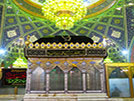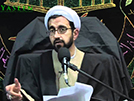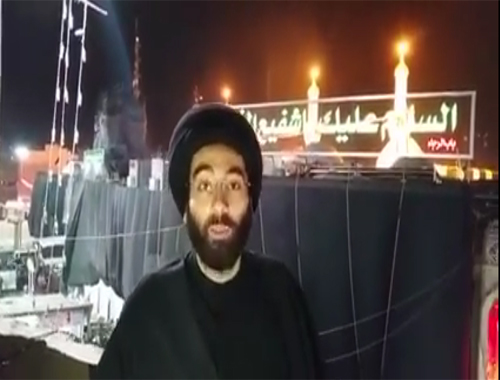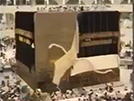Rules of a Traveler's Prayers
- Details
- Hits: 5951
.jpg)
Rules of a Traveler's Prayers
A passenger who travels at least eigth continuous parasangs (approximately 45 kilometers)---even if distance is covered by going and returning---should shorten the four rak'ah daily prayers (i.e., zuhr, 'asr, and 'isha) to two rak'ah, provided that the following five conditions hold:
1. From the start, the traveler intended to go eight parasangs (defined by Islamic law, shar'ia); not that unintentionally he set out and accidentally went eight parasangs.
2. The traveler did not intend to stay for ten days. If he does not know whether he will stay for ten days or not, he must say his prayers in the shortened format.
3. The traveler did not set out for an unlawful (haram) purpose (such as theft), and the trip itself was not unlawful (haram), as when the trip is harmful for one, or when a woman travels without the permission of her husband when the trip was not obligatory for her.
4. The traveler is not a nomad, unless the trip was taken for ziyarah, hajj, trade or the like. In these cases the prayer must be said in shortened format.
5. The traveler's job is not traveling, such as a driver, unless he takes the trip for another purpose, such as ziyarah, in which case his prayer must be said in shortened format.
A traveler who intends to stay for ten days continuously in one place, must say his four rak'ah prayers in full format, as when one intents to stay in one place from the morning of the first day until the evening of the tenth day (equal to ten days and nine nights), or from noon of the first day to noon of the eleventh day.
If a trave traveller intends to stay for ten days, and preforms a four rak'ah prayer, and then changes his mind, however long he stays, he still has to say his prayers in full format, with four rak'ah.
If one intends to stay for ten days but remains longer, he still has to say his prayers in full format.
If one knows that he is a traveler and knows that he should shorten his prayers, but he forgets it, and says a prayer in full format withour paying attention out of habit, his prayer is invalid.
Furthermore, if he forgets the rules for travelers or the rule for his trip, he must say his prayer over again if he has time; rather, according to an obligatory precaution (ihtiyat wajib), if the time has passed, he should say a make-up prayer (qada).
If a traveler who does not know that he must say his prayer in shortened format (i.e., with two rak'ah) says his prayer in full format, his prayer is correct.
If someone who must say his prayer in full format says it in shortened format, then no matter what, the prayer is invalid.
If someone is in his own home town at the beginning of the time for prayer, and sets out to travel without saying his prayer, he must say his prayer in shortened format. If he is a traveler at the beginning of the prayer time, and he does not say his prayer, when he reaches his home town, his prayer should be in full format.
Someone who, for example, comes to Mashhad, and from when he first enters Mashhad intends to go to the surrounding area, such as the village of Turqabeh, which is outside the city, cannot intend to stay for ten days and must say his prayer in shortened format.
However, if from when he first enters Mashhad, his intention is only to leave the city for the surrounding area for one or two hours during the duration of the ten days, this does no harm to his intention of staying for ten days, and he must say his prayers in full format. (What is meant by the surrounding area is those places that are less than four shar'ia parasangs---approximately 22.5km.)
If one goes out of town further than four parasangs, the intention to stay for ten days is violated, and when one returns to the town, prayers must be said in shortened format or another ten day intention must be made.
Those who decide to compensate on their trip for prayers missed while they were home must say them in full format as they would if at home.
A traveler who has made the intention of residing for ten days and who says his prayers in full format is obliged to fast during Ramadan. In other months he may perform recommended fasts or make up for missed obligatory fasts.
A traveler who must say his prayers in shortened format may not perform an obligatory or recommended fast. However, if he had made a vow (nadhr) to fast on a specific day (such as the 15th of Sha'ban), even if he is a traveler it is obligatory for him to fast on that day.
A traveler may participate in the Friday congregational prayer, and say his prayer behind the Friday prayer leader. In this case, his Friday prayer suffices for the noon prayer of that day.
It is premissible to make prostration (sajdah) on the stones of the shrine, its porches and its courtyards.
If the muhr (the clay tablet on which prostrations are usually made) is lost while one is saying prayers, or if a child runs away with it, and if there is nothing available on which it is legitimate to make prostrations, then, if there is sufficient time, one must break off his prayer and find a muhr (or something else on which it is permissible to make prosrations) and say his prayers with it.
If there is not enough time, he should prostrate on what grows from the ground but is not edible and cannot be used for clothing, such as a dry leaf or paper made from straw or cotton. If such things are not available, he should prostrate on his cotton clothes, but if this is also not possible, he can prostrate on the back of his hand.
Placing one's forehead on the door of the haram or kissing it, and likewise touching or kissing the grating of the burial chamber (darih), is not necessary for the acceptability of one's ziyarah, rather, if such a deed causes trouble for the other pilgrims it will be impermissible.
If one has intended to drop some money or some thing down into the immaculate burial chamber, while this would cause trouble or annoyance for the other pilgrims, it would be better to give it to the Endowment Office of the haram (nudhurat) and get a receipt for it.
It is not allowed to take a Qur'an, Mafatih al-Janan, or a muhr our of the immaculate shrine or from Gawharshad Mosque to a hotel or inn, even if it is intended to return back there.
It is not permitted to write anything, such as one's initials, what someone saw in a dream, etc., on the pages of the Holy Qur'an, Mafatih or the prayer books.
During menstruation, ladies may enter the courtyards and porches of the haram, and may occupy themselves with their ziyarah, reciting supplications and repeating the fourfold tasbihat (i.e., subhana Allahi wa al-hamdu lillahi wa la ilaha ila Allahu wa Allahu akbar). However, they cannot stay in places where there is a mosque, such as the Masjid Bala Sar, Masjid Gawharshad and likewise, the Rawdah Munawwarah (the place where the immaculate grating of Imam is).
If one vows to sacrifice a sheep for Imam Reza (A.S.) to be used in the dining hall of the shrine, one must act according to the vow. Hence, it is not permitted to divide the money for the sheep or its meat among the other pilgrims or the poor at one's inn or place of residence.
Note: These rules are take from Tawzeeh al-Masa'il by Imam Khomeini(R.A.)
2. The traveler did not intend to stay for ten days. If he does not know whether he will stay for ten days or not, he must say his prayers in the shortened format.
3. The traveler did not set out for an unlawful (haram) purpose (such as theft), and the trip itself was not unlawful (haram), as when the trip is harmful for one, or when a woman travels without the permission of her husband when the trip was not obligatory for her.
4. The traveler is not a nomad, unless the trip was taken for ziyarah, hajj, trade or the like. In these cases the prayer must be said in shortened format.
5. The traveler's job is not traveling, such as a driver, unless he takes the trip for another purpose, such as ziyarah, in which case his prayer must be said in shortened format.
A traveler who intends to stay for ten days continuously in one place, must say his four rak'ah prayers in full format, as when one intents to stay in one place from the morning of the first day until the evening of the tenth day (equal to ten days and nine nights), or from noon of the first day to noon of the eleventh day.
If a trave traveller intends to stay for ten days, and preforms a four rak'ah prayer, and then changes his mind, however long he stays, he still has to say his prayers in full format, with four rak'ah.
If one intends to stay for ten days but remains longer, he still has to say his prayers in full format.
If one knows that he is a traveler and knows that he should shorten his prayers, but he forgets it, and says a prayer in full format withour paying attention out of habit, his prayer is invalid.
Furthermore, if he forgets the rules for travelers or the rule for his trip, he must say his prayer over again if he has time; rather, according to an obligatory precaution (ihtiyat wajib), if the time has passed, he should say a make-up prayer (qada).
If a traveler who does not know that he must say his prayer in shortened format (i.e., with two rak'ah) says his prayer in full format, his prayer is correct.
If someone who must say his prayer in full format says it in shortened format, then no matter what, the prayer is invalid.
If someone is in his own home town at the beginning of the time for prayer, and sets out to travel without saying his prayer, he must say his prayer in shortened format. If he is a traveler at the beginning of the prayer time, and he does not say his prayer, when he reaches his home town, his prayer should be in full format.
Someone who, for example, comes to Mashhad, and from when he first enters Mashhad intends to go to the surrounding area, such as the village of Turqabeh, which is outside the city, cannot intend to stay for ten days and must say his prayer in shortened format.
However, if from when he first enters Mashhad, his intention is only to leave the city for the surrounding area for one or two hours during the duration of the ten days, this does no harm to his intention of staying for ten days, and he must say his prayers in full format. (What is meant by the surrounding area is those places that are less than four shar'ia parasangs---approximately 22.5km.)
If one goes out of town further than four parasangs, the intention to stay for ten days is violated, and when one returns to the town, prayers must be said in shortened format or another ten day intention must be made.
Those who decide to compensate on their trip for prayers missed while they were home must say them in full format as they would if at home.
A traveler who has made the intention of residing for ten days and who says his prayers in full format is obliged to fast during Ramadan. In other months he may perform recommended fasts or make up for missed obligatory fasts.
A traveler who must say his prayers in shortened format may not perform an obligatory or recommended fast. However, if he had made a vow (nadhr) to fast on a specific day (such as the 15th of Sha'ban), even if he is a traveler it is obligatory for him to fast on that day.
A traveler may participate in the Friday congregational prayer, and say his prayer behind the Friday prayer leader. In this case, his Friday prayer suffices for the noon prayer of that day.
It is premissible to make prostration (sajdah) on the stones of the shrine, its porches and its courtyards.
If the muhr (the clay tablet on which prostrations are usually made) is lost while one is saying prayers, or if a child runs away with it, and if there is nothing available on which it is legitimate to make prostrations, then, if there is sufficient time, one must break off his prayer and find a muhr (or something else on which it is permissible to make prosrations) and say his prayers with it.
If there is not enough time, he should prostrate on what grows from the ground but is not edible and cannot be used for clothing, such as a dry leaf or paper made from straw or cotton. If such things are not available, he should prostrate on his cotton clothes, but if this is also not possible, he can prostrate on the back of his hand.
Placing one's forehead on the door of the haram or kissing it, and likewise touching or kissing the grating of the burial chamber (darih), is not necessary for the acceptability of one's ziyarah, rather, if such a deed causes trouble for the other pilgrims it will be impermissible.
If one has intended to drop some money or some thing down into the immaculate burial chamber, while this would cause trouble or annoyance for the other pilgrims, it would be better to give it to the Endowment Office of the haram (nudhurat) and get a receipt for it.
It is not allowed to take a Qur'an, Mafatih al-Janan, or a muhr our of the immaculate shrine or from Gawharshad Mosque to a hotel or inn, even if it is intended to return back there.
It is not permitted to write anything, such as one's initials, what someone saw in a dream, etc., on the pages of the Holy Qur'an, Mafatih or the prayer books.
During menstruation, ladies may enter the courtyards and porches of the haram, and may occupy themselves with their ziyarah, reciting supplications and repeating the fourfold tasbihat (i.e., subhana Allahi wa al-hamdu lillahi wa la ilaha ila Allahu wa Allahu akbar). However, they cannot stay in places where there is a mosque, such as the Masjid Bala Sar, Masjid Gawharshad and likewise, the Rawdah Munawwarah (the place where the immaculate grating of Imam is).
If one vows to sacrifice a sheep for Imam Reza (A.S.) to be used in the dining hall of the shrine, one must act according to the vow. Hence, it is not permitted to divide the money for the sheep or its meat among the other pilgrims or the poor at one's inn or place of residence.
Note: These rules are take from Tawzeeh al-Masa'il by Imam Khomeini(R.A.)











